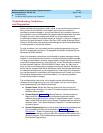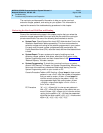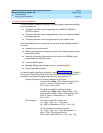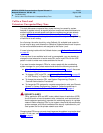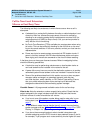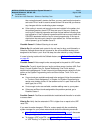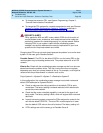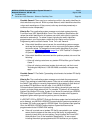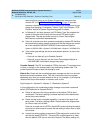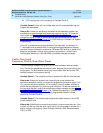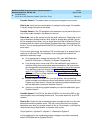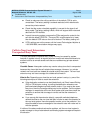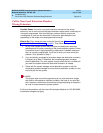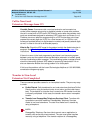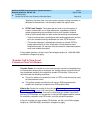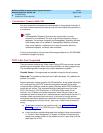
MERLIN LEGEND Communications System Release 6.1
Network Reference
555-661-150
Issue 1
August 1998
Troubleshooting
Page 6-10Call to Non-Local Extension: Silence or Fast Busy Tone
6
select the 3ULQW option on the System Programming menu and then
choose
35,,QIR.“PRI Facilities Switch Type” on page 23 provides
summary instructions for determining the switch type programmed at your
system and changing it if necessary. “Switch Type” in the Chapter 4 “PRI
Facilities” section of
System Programming
gives full details.
■ In Release 6.1 and later systems, the PRI Switch Type Test requests the
system at the other end to verify that the correct PRI switch type is
programmed. This test should be run only by Lucent Technologies
technicians or authorized representatives.
■ If the call is carried over other systems connected by tandem PRI facilities,
the coordinating system manger must ensure that the settings are correct,
as in this example of MERLIN LEGEND Communications Systems:
System A LEGEND-PBX→System B LEGEND-Ntwk→System C LEGEND-PBX
■ If the switch type settings are correct and problem persists, do one of the
following:
— If the call is a data call, go to Possible Cause 8.
— If the call is not a data call, call the Lucent Technologies Helpline at
1 800 628-2888; consultation charges may apply.
Possible Cause 8: The FRL for the default COR for tie trunks (T1-emulated voice
or data, or analog) on the remote system may be blocking tandem calls. The
private network includes at least one analog tie trunk.
What to Do: Check with the coordinating system manager so that he or she can
determine where the problem exists. This may involve more than one system,
depending upon how your private network is set up. For example, a call might be
routed across the private network in a fashion such as this:
Origin System A
→System B→System C→Destination System D
In this configuration, the coordinating system manager must check routes and
default COR attributes for Systems B and C.
■ Check to make sure the calling restriction of the default COR is set to
unrestricted. The factory setting is outward restricted, which blocks calls
across the private network.
■ Check that the routes voice/data capability is correct for the type of call
being made. The factory setting is Both. Routes need to be programmed
for voice or data, but not both.
If the call is routed over the PSTN, check ARS routes including the default
local and non-local routes to be sure that the setting is either voice or data,
but not both.
■ In each intervening system, compare the FRLs assigned to routes for the
call with the default COR FRL. The route FRL must be equal to or lower
than the default COR value or the call is blocked. The factory setting is 3.



